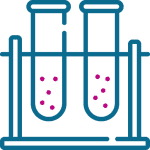EBV (Epstein-Barr virus) IgG
Infectious mononucleosis is an acute viral infection characterised by fever, sore throat and enlarged lymph nodes. The source of infection is people with acute or chronic infectious mononucleosis, as well as healthy carriers.
20,00 €

Epstein Barr Virus IgG – IgG antibodies to the EBV (Epstein Barr virus) capsid antigen – the test indicates a history of contact, active infection or viral relapse. Epstein-Barr virus causes an acute infection called infectious mononucleosis. The clinical spectrum of symptoms caused by the virus is very broad, with fever, angina, and enlargement of lymph nodes and spleen.
IgG antibodies to Epstein Barr virus (EBV) capsid antigen are detected in weeks 2-4 of illness. A blood test shows an elevated monocyte count, Ig G or Ig M. An increase in IgG antibodies to the EBV capsid antigen (Epstein barr) without an increase in Ig M indicates that the disease has been contracted in the past and that immunity has developed. The increase in this indicator lasts a lifetime.
Infectious mononucleosis
Infectious mononucleosis is an acute viral infection characterised by fever, sore throat and enlarged lymph nodes. The source of infection is people with acute or chronic infectious mononucleosis, as well as healthy carriers. People start spreading the infection a few weeks after being infected.
Spread of the disease
Epstein-Barr viruses are spread by droplet transmission through airborne and contact transmission. Infection can occur through direct contact with the patient (e.g. kissing or using the same cutlery). Viruses are spread by the patient talking, sneezing and coughing. Infectious mononucleosis is often contracted through kissing, which is why it is also known as kissing disease. Epstein-Barr viruses are widespread throughout the world. Around 90-95% of the total number of people in the EU. people around the world are infected with these viruses. EBV antibodies are produced in the body of a person who has contracted the disease and persist throughout life. Epstein-Barr viruses are most commonly contracted by children under 5 years of age, but the viruses do not usually cause any symptoms in them, or they cause respiratory infections that are not usually suspicious for infectious mononucleosis. Resistance to EBV-induced infectious mononucleosis develops after contact with the viruses.
Signs of the disease
Often the onset of the disease is non-specific: general malaise, extreme fatigue, lack of appetite, chills, muscle aches. This is followed by a temperature rise, a cold, a sore throat and headache, and “breaking” bones. The temperature may be high for a few days, then drop and never rise above 38°C. The fever lasts from 2-7 to 20 days. There may be small reddish spots on the face, torso and limbs. One of the most common symptoms is enlargement of many lymph nodes, especially in the neck, armpits and, less commonly, groin. The throat and tonsils are red, and greyish or greenish plaques appear on the tonsils. There may also be inflammation of the gums and oral mucosa. Fatigue can persist for several months.
In children under 5 years of age, EBV infection usually does not cause symptoms, but it can cause uncharacteristic symptoms such as irritability, abdominal pain due to enlargement of mesenteric lymph nodes or the spleen, and signs of upper respiratory tract infection. Symptoms of infectious mononucleosis rarely last longer than 4 months, but if it persists for more than 6 months, it is called chronic EBV infection. It is not recommended to do sports or heavy work for 2 months after the illness.
EBV infection is diagnosed by clinical symptoms and laboratory tests:
- Elevated :
IgM – acute infection (3-6 weeks after onset).
Epstein-Barr virus IgG – chronic infection or past contact (lifetime). - Complete blood count : leucocytes (of which lymphocytes <50%) monocytes (30 to 70%).
- Liver enzymes AST and ALT may increase in some patients.
There is no specific treatment. Treatment is based on the prevailing symptoms: temperature, pain.
You can consult our family doctors.
